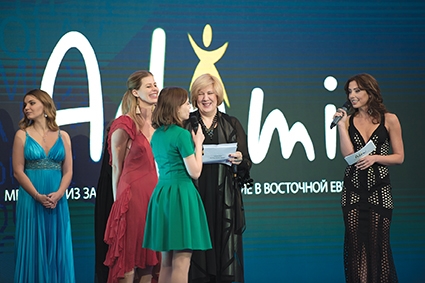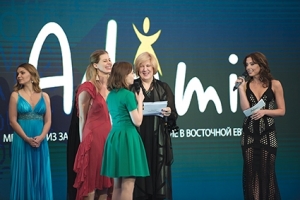Winners of the 2016 ADAMI Media Prize Announced
Georgian, Moldovan, and Ukrainian journalists were awarded the ADAMI Media Prize for Cultural Diversity in Eastern Europe at a gala ceremony in the Ukrainian capital of Kyiv on November 24.
This is the second edition of the ADAMI Media Prize, which awards outstanding films, videos, and websites from Eastern Europe and the South Caucasus that promote diversity and peaceful co-existence.
12 films and projects were nominated by an international jury, out of which five received the prize.
The 2016 gala had the patronage of Thorbjørn Jagland, Secretary General of the Council of Europe, and Dunja Mijatovic, the OSCE Representative on Freedom of the Media, who presented the ADAMI Media Prize for Information (non-fiction) at the gala.
“This prize puts focus on the importance of free media in the region and the role it plays in informing people on issues of public interest, not least on integration and cultural diversity,” Mijatovic said.
The winner of the ADAMI Media Prize for Information (non-fiction) was the film Forbidden Friends, produced by Chai Khana (Georgia). This story of two women living in Tbilisi explores the challenges they face because of their unconventional friendship; one is an ethnic Armenian, and the other is from Azerbaijan.
The ADAMI Media Prize for News and Short non-Fiction was given to the TV series The Foreigner on STB TV by Dmytro Lytvynenko (Ukraine), about Western entrepreneurs who’ve established businesses in Ukraine, and their efforts at integration.
The ADAMI Online Prize for Web Videos was given to Tako Robakidze (Georgia), for A Look Beyond the Headlines. This multimedia video seeks to counter the stereotypes surrounding the Pankisi Gorge of Georgia by showing the everyday lives of the ordinary people of Pankisi.
The website MyAngle by George Gogua (Georgia) won the ADAMI Online Prize for Web Pages. The website is a networking platform for journalists from Armenia, Azerbaijan, and Georgia.
The Young ADAMI Media Prize was awarded to Generation Emigration, by Natalia Sergheev (Moldova), broadcasted on TV Moldova 1. The film explores the phenomenon of mass youth emigration from Moldova.
ADAMI introduced a new type of award, the ADAMI Fellowship / ARTE prize, within ADAMI’s cooperation with French-German cultural TV channel ARTE. The inaugural prize was given to nominee Marita Tevzadze (Georgia), who will spend a one-month fellowship working with the team of ARTE Journal in Strasbourg.
On top of the prize winners, ADAMI awarded a Special Mention for Web Videos for the interactive video “What is Hate Speech?” by Ihar Nazaranka / mediakritika.by, from Belarus. It is the first Belarusian production to receive a mention from ADAMI.
A Special Mention for News and Short non-Fiction was given to the news report “Drastamat vs. Haykandukht: In-House Battle,” by Artak Vardanyan of Armenia. This unusual election story of a husband and wife competing against each other in local elections gives a new perspective on questions of tolerance in gender roles and politics.
The ADAMI Media Prize for Cultural Diversity in Eastern Europe is made possible through the support of funders the Federal Foreign Office (Germany), and ProCredit Holding (Germany).












